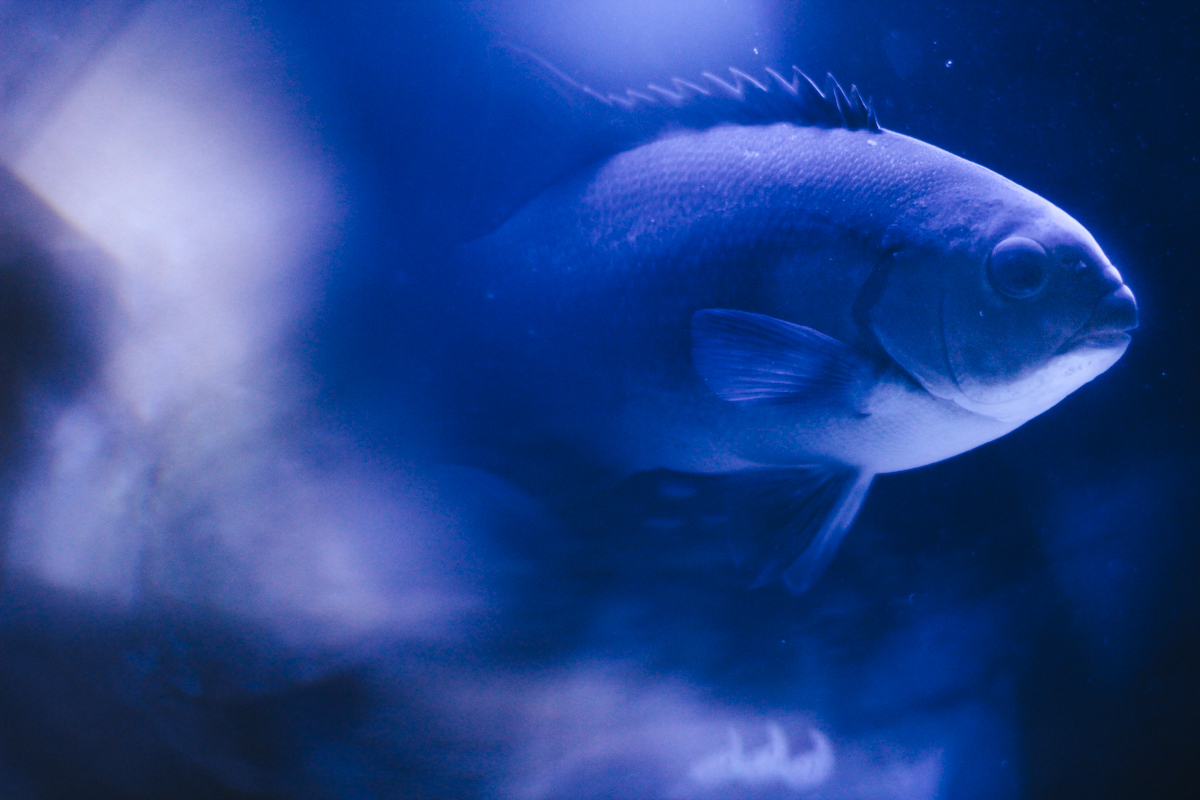For anyone who has known me for even a short period of time, it's no secret that I love fish. I don't know what it is about them, I just love them. I love the way that they move, they way that they look at you, the way that they behave. For crying out loud, I have a fish onesie (which I may or may not have worn in the lab). I cannot explain it, I just know that I have loved fish for years. I've kept my own tank since late middle school and have always found solace in visiting aquariums.
This time around, I had my mind set on studying fish. Why not do an experiment on them? There was nothing "stopping me" from studying fish. I understand them but there is also so much about them that I don't understand, so much that I want to understand. They are secrets kept in the dark, waiting for me and others to come searching with a light. I am an explorer in an underwater cave bringing light to the never before seen waters. At least that's how I like to think of it.
For me, this research is incredibly exciting. However, it doesn't lend itself to being necessarily "blog-worthy" like my last endeavor. I'm not staying up all night for several days in a row, thank goodness. There isn't that feeling of "survival" or an "edge" to it. I am staring at a pool for a couple hours in the morning watching fish behavior and then staring at video footage and plugging data into Excel for the rest of the time (both of which are exhausting in their own right but not nearly as much as my last undertaking). Research is one of those things that either seems incredibly glamorous and exciting to people ("I'm diving with sharks everyday and studying the effects ocean acidification on their behavior") or incredibly not-so-glamorous and perhaps boring ("I'm analyzing 16-years' worth of data on barnacle population sizes off the coast of southern Maine, meaning I sit and plug in data for 8 hours straight every day"). The truth is that many research projects include a range of aspects: you have the exciting parts where you are getting the data or the animals and the sometimes very boring parts of plugging it all into your computer and then running it through statistical measures.
My current research requires filming 10 minute trials using a GoPro plus watching the fish do their thing from behind a mesh net. I have to wake up pretty early to get started since it can take a while and has to be done in the morning, but I don't necessarily mind it. The first round of experiments I groggily dragged myself out of the bed after having about three-ish hours of sleep (my own fault, we were having a nice get together and then a certain spacey album project called Planetarium that I had been waiting to hear for months came out so I had to give it a listen). I traversed my way in the dark to a place I knew all too well after many intimate and sleepless nights a year ago. The promise of sunlight peeked out over the hills, casting a thin veil of red-orange glow that hugged the skyline. In the early morning air and pale light I realized how much I had grown since the previous year and how much stronger I was now. I was able to hold my own and conduct my experiments solo. I had a set plan and knew the procedures. I was finally starting to feel like a "real" scientist, not just someone who was a bit lost in the flujo of things I knew little about. It's good to have confidence in yourself and in your ability, and it's really wonderful to feel like you are in a place where you finally feel comfortable doing what you have been preparing yourself to do for years and confident enough to have at least a little authority with it.
The project is coming along, slowly. I am learning to flow like the waters and take life as it comes like the marine animals that live their lives in constant questioning. They don't necessarily know when they will be getting the things they need or what the day will bring, but they embrace it and live through it. Such courage from often very little animals.
I believe you can learn a lot from fish. Fish are such patient creatures. One of the predator fish in my experiments stared intently for nearly thirty minutes at the prey fish across the transparent plastic barrier. He knew the barrier was there and that he couldn't quite possibly make through after many failed attempts, but he remained where he believed he could escape if at all possible, waiting for a moment I knew would never come. Fish are so very focused, locking onto their subject and maintaining a notable amount of intensity with the task for long periods of time. Fish are also quite curious. They explore new places or try new things, bolting around a new habitat or peeking into an unfamiliar crevice. Fish can also become stressed, sometimes even extremely stressed. Excessive stress can have damaging effects on fish, often in more visible ways than we often show. Their colors turn pale, they breathe faster, and often they fall ill or contract an infection. Fish can become stressed by a variety of factors, including being housed with unfriendly fish or bullies, being subjected to bad environmental factors, or being thrust into a completely new situation after previously stressful events. Fish vividly show that stress can affect you, often deeply.
Fish have been my teachers over the past few weeks. When pumps break or we don't get a lot of fish, I remember their patience and how they just flow with the water. Often the journey is more important than the destination, and I think that period of flux between the beginning and the end of something are some of the most important aspects of an experience.
Oh the things I do for the love of fish! Waking up early, braving monster storms, digging through mountains of old piping, and other unconventional activities have all been done in the name of fish and science. Perhaps I love them too much, or perhaps I've simply found my calling. Either way, I don't think it's a love that will fade away any time soon.




